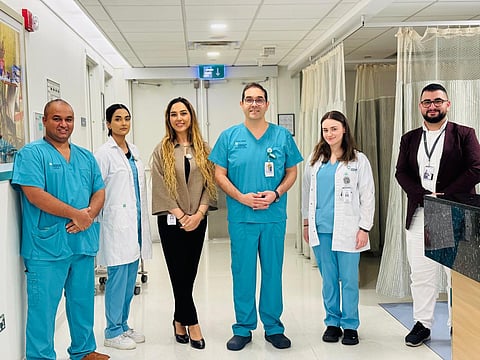American Hospital Dubai achieves new milestone in cancer care with advanced selective internal radiation therapy
The hospital is among the few private healthcare institutions in the UAE offering SIRT

American Hospital Dubai is proud to announce the successful implementation of a complex and highly sophisticated procedure called Selective Internal Radiation Therapy (SIRT) on two patients with liver cancer. The SIRT procedure represents a major advance in the hospital’s comprehensive, minimally invasive cancer treatment services.
Certain types of liver tumors cannot be removed with surgery alone. SIRT, also known as selective intra-arterial radiotherapy, delivers radiation directly to liver tumors via the hepatic artery (the blood vessel supplying oxygen to the liver).
The SIRT procedure involves delivering millions of microspheres loaded with yttrium-90, a radioactive substance, through a catheter into the liver. These microspheres, or tiny radioactive beads, lodge themselves in and around the tumor cells, destroying them.
Targeted delivery allows high-dose tumor irradiation while protecting surrounding healthy tissue, providing an effective treatment option for patients with unresectable (surgically inoperable) liver-dominant malignancies.
American Hospital Dubai is among the few private healthcare institutions in the UAE offering SIRT, joining global leaders in precision oncology. It used SIRT on two highly complex cases: Case 1 involved a patient with colorectal liver metastases, which are cancers that have spread to the liver from the colon or rectum. The patient had undergone first-line chemotherapy, and since the tumor was located adjacent to critical vascular structures, it rendered surgical resection unfeasible.
In Case 2, the patient had neuroendocrine liver metastases and residual disease, meaning the cancer cells remain after treatment. He had undergone four cycles of lutetium-177 dotatate therapy, a targeted radiation treatment for neuroendocrine tumors, including a 5-cm lesion that persisted.
American Hospital Dubai conducted a thorough assessment of the two patients by a multidisciplinary tumor board, which included interventional radiologists, oncologists, and hepatobiliary surgeons. The tumor board recommended SIRT as a targeted, minimally invasive method for both to manage tumor progression and potentially eliminate the malignancy.
Each SIRT procedure was conducted in two carefully planned stages: first, vascular mapping and simulation using nuclear medicine to ensure safe and accurate delivery; second, the treatment stage, which involved administering yttrium-90-loaded microspheres into the tumor-fed arteries.
Both patients tolerated the procedure well, with no complications, and were safely discharged after recovery. Follow-up PET-CT scans showed excellent tumor coverage with no significant extrahepatic uptake (absorption and accumulation of substances by the liver), confirming the treatment’s precision and effectiveness.
The patients benefited from SIRT’s advantages, which include a precise, localized therapy to target liver-dominant disease, a minimally invasive outpatient or short-stay procedure, and being performed after multidisciplinary decision-making to ensure optimal patient selection. SIRT is suitable for patients unfit for surgery or those with prior systemic therapy failure.
The highly successful procedures reaffirm American Hospital Dubai’s renown for specialized skills and a multidisciplinary team approach. The hospital’s subspecialized, cutting-edge interventional oncology excellence has helped establish it as a referral centre for complex liver tumors.
American Hospital Dubai continues to reshape what’s possible in liver cancer care — one patient at a time.
This content comes from Reach by Gulf News, which is the branded content team of GN Media.
